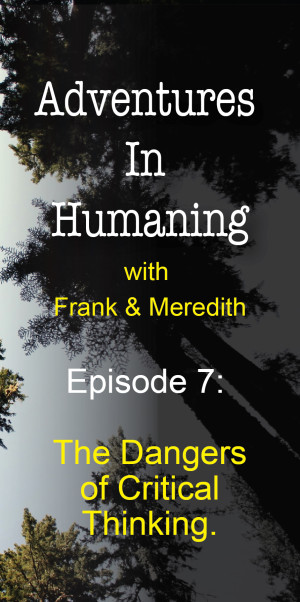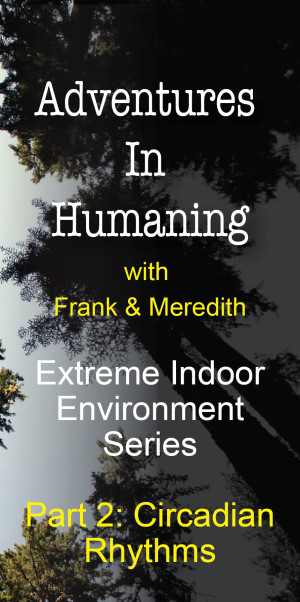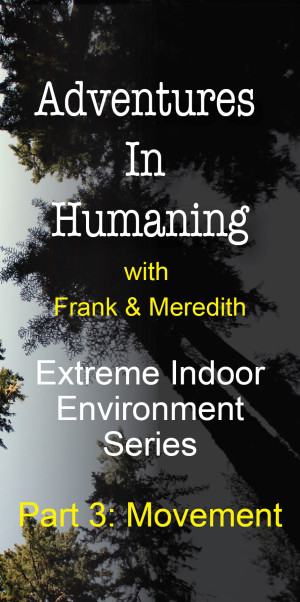 Welcome back! Your adventure continues. This week we delve back into the concept of the extreme (indoor) environment. While it can be difficult to conceptualize your microbiome like we talked about in the first part, and it takes a bit more cognitive energy to grasp your relationship with your circadian rhythm like we chatted about in the second part, in this episode we touch on the classical, physical, tangible environment. We meander about what our physical environment does to us, how it shapes and informs us. We explore some of the mismatch that may be prevalent in this modern day extreme environments.
Welcome back! Your adventure continues. This week we delve back into the concept of the extreme (indoor) environment. While it can be difficult to conceptualize your microbiome like we talked about in the first part, and it takes a bit more cognitive energy to grasp your relationship with your circadian rhythm like we chatted about in the second part, in this episode we touch on the classical, physical, tangible environment. We meander about what our physical environment does to us, how it shapes and informs us. We explore some of the mismatch that may be prevalent in this modern day extreme environments.
Ready to get lost with us?
Stop by and join the conversation on Twitter on Facebook (Frank is still waiting for a carrier pigeon).
Relevant information and links:
“We adapt to our environment. We can’t even help it. We are going to adapt our environment matter what.”
“You can’t decide not to.”
“Right, you can’t opt out of it”
~ Frank & Meredith
“There’s lots of different ways that our homes, or offices or any other indoor environment can shape us physically, and one of them that may not be super intuitive to people is our eyesight.”
~ Meredith
- How far can you see? Is it possible you can’t see far because you don’t look far? For a magnificent explanation and break down on myopia check out Jake Stiener, End Myopia
- Perhaps the reason many people can not get out of a squat is largely because we don’t squat.
- We are literally reshaping our bodies
- Humans like most biology need the input and the catalyst of information to build the system.
“A human can do a pull-up. They are perfectly capable of doing a pull-up, but not all humans can do a pull-up. Because not all humans do pull-ups.” ~Frank
“There are ways to correct your vision naturally using your power of adaptation. Spending more time outside is part of that equation” ~Meredith
- Real life anecdotal testimonial of eyesight strengthening… And the much rarer and impressive account of a teenage boy actually listening to his dad.
- The indoor environment is a cast for your eyeballs.
- We are stuck in a standardized measured exacting environment. Not much, if anything, in our modern architecture gives us the stimulation and input as the fractal nature of nature.
“We are going from our box of a house, to our box of a car, to our box of a gym… and we’re doing all sorts of things like box jumps. Our human life is a life full of boxes, we think in a box, we live in a box.” ~Frank
“I leap about in the forest, It’s what I do… I would take video but I’m busy leaping about in the forest” ~Frank
- Be careful with your transition from modern human to full on minimalist loin cloth wearing vine swinging log leaping human. Transition slowly.
- Comfort toilet. Toilets are a piece of furniture. Modern western toilets are not designed with human biology or biomechanics in mind. Your toilet is probably constipating you. The answer? Properly aligned illumination position… The Squat! Squatty Potty
- As promised This is the hilariously uncomfortable video mentioned.
- This is the not so funny video purely instructional video.
- Other than eyeballs and pooping, Furniture is another way that your indoor environment casts your body. Ask yourself how often do you sit on the floor or the ground? The lack of simply getting up off the floor on a daily basis is having a negative impact on the vast majority of western culture. Our human muscularity, tendons and bone structure and strength are suffering from the lack of this primal input.
- One of the most horrible things that can happen to an elderly individual is falling and breaking something. Studies clearly correlate a connection between the ability to get oneself up and off the ground and all cause mortality for seniors.
- Modern conveniences mainly marketed for the elderly that outsource movement thereby robbing said individual of essential muscle building bone strengthening natural movement
- #Humaning tips to slowly transition
- You do not have to use the furniture in your house simply because it’s there. If you do use it perhaps you can try something a little bit different, and use it to increase movement and maybe have a little fun in the meantime #NotARule
- Countertops and the like may be robbing you of some natural movement opportunities. If you did not have these opportunities you would be forced to prep your food in a squat. How much work are other people doing for your meal? Consider for a moment, how much of your meal is outsourced to other human beings or machines. How much movement are you missing because of these modern conveniences?
- A neat stacking opportunity via the Nutritions Movement circles is to rearrange your cabinets so that your plates and most used items on the bottom shelves and bottom cabinets that what you’re encouraged to squat routinely.
- So play with the placement of stuff in your house.
- Our extreme indoor environment are for sure in need of review, but another aspect that our indoor environment do that may negatively impacting us as modern day humans, is the separation between us, and the natural world.
- Keep off the pavement!
- A lawn meander and rant. Why have a lawn if you can’t walk on it?
- Beds, another piece of furniture, are they a sleep orthopedic? Pillows as well? Do we really need those super thick pillows or are they perhaps mishaps get us.
- The height and the firmness of the beds maybe something to look into.
“Theres not much in nature that’s going to mimic a foot of memory foam” ~Frank
- Sleep hygiene.
- Frank & Meredith pontificate upon this term and offer perhaps a more accurate term.
“I don’t want to sleep hygienic”( Meredith)…”I want to sleep dirty” (Frank)
Thank you for listening to part three of Extreme Indoor Environments.
If you like anything you heard here, if it has intrigued you, resonated with you or has provoked a changed your thinking or perspective, if you have found value in the information provided, or if it moved you in someway, please give us the pleasure of a personal review and or rating and iTunes. We may even read it on the podcast.
We would also like to encourage you to join the conversation and get involved in the meandering discussion by way of social media whichever is your favorite. You can find us on Twitter and Facebook.
Cheers, be well
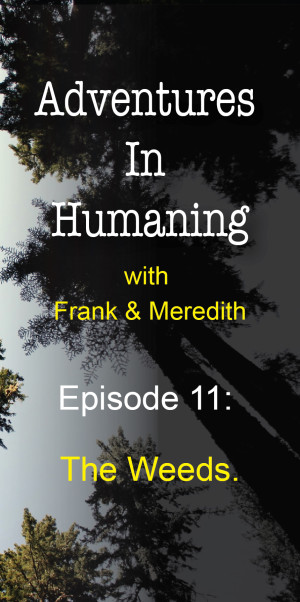 Click here to go right to the show.
Click here to go right to the show.
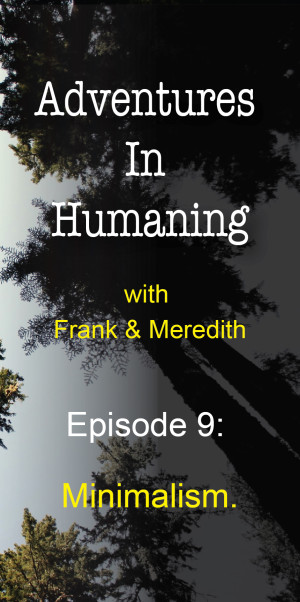 Minimalism.
Minimalism. 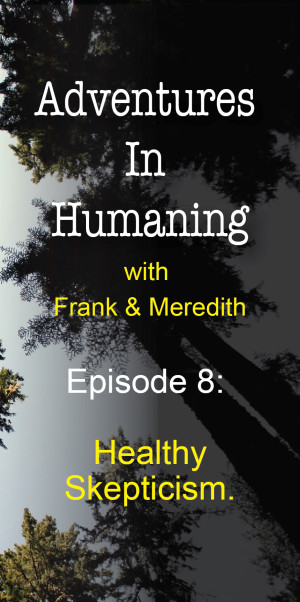 This show explores what it means to be a healthy skeptic. Frank and I argue this means using your critical thinking skills to question your relationship with… well, all things that you interact with on a daily basis.
This show explores what it means to be a healthy skeptic. Frank and I argue this means using your critical thinking skills to question your relationship with… well, all things that you interact with on a daily basis.